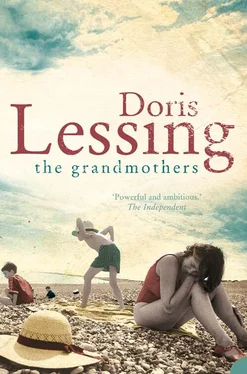Doris Lessing - The Grandmothers
Здесь есть возможность читать онлайн «Doris Lessing - The Grandmothers» весь текст электронной книги совершенно бесплатно (целиком полную версию без сокращений). В некоторых случаях можно слушать аудио, скачать через торрент в формате fb2 и присутствует краткое содержание. Жанр: Старинная литература, на английском языке. Описание произведения, (предисловие) а так же отзывы посетителей доступны на портале библиотеки ЛибКат.
- Название:The Grandmothers
- Автор:
- Жанр:
- Год:неизвестен
- ISBN:нет данных
- Рейтинг книги:3 / 5. Голосов: 1
-
Избранное:Добавить в избранное
- Отзывы:
-
Ваша оценка:
- 60
- 1
- 2
- 3
- 4
- 5
The Grandmothers: краткое содержание, описание и аннотация
Предлагаем к чтению аннотацию, описание, краткое содержание или предисловие (зависит от того, что написал сам автор книги «The Grandmothers»). Если вы не нашли необходимую информацию о книге — напишите в комментариях, мы постараемся отыскать её.
The Grandmothers — читать онлайн бесплатно полную книгу (весь текст) целиком
Ниже представлен текст книги, разбитый по страницам. Система сохранения места последней прочитанной страницы, позволяет с удобством читать онлайн бесплатно книгу «The Grandmothers», без необходимости каждый раз заново искать на чём Вы остановились. Поставьте закладку, и сможете в любой момент перейти на страницу, на которой закончили чтение.
Интервал:
Закладка:
Inside the envelope was a sheet of writing paper and scrawled on it, ‘Please, please, go away. Go away now. Please. Don’t hurt her. This is your boy’
A photograph, a decent size for a casual snap, of a boy of about eight, standing by himself, legs apart, smiling. This picture was like one of himself, James, at about the same age. Black and white of course, so you couldn’t see what colour his eyes were. But if the rest was like James, then why not the eyes? And Daphne had blue eyes.
lie took his time putting the photograph back, and then the sheet of paper. He stood smartly to attention and saluted the invisible Betty, who was watching him, he knew. He went off down the street, slowly, keeping in the shadows from the trees, as he had learned to do in India where the heat struck and burned, was not kindly, as it was here.
It was late morning, a fine Cape day, and over the famous mountain thin loose cloud lay, white and shiny. The famous tablecloth. Down he went, sending distracted looks to the sea shimmering peaceably there. He walked clumsily, people were staring. He sat on a bench in some public place but then got up and walked on, found another, sat down, pulled out the photograph and looked at it, for a long time.
He could not stay still. He began aimless fast walking, and found himself in some kind of market, where under trees long trestles were laden with every kind of dried fruit: peaches, apricots, pears, plums, apples, yards and yards of them, every trestle with its attendant woman, who was black or brown, at least, not white. Fruit pale yellow burnt umber, purple, black; fruit red and pale brown and gold and rosy and green. Some was crystallised, colours glowing though a frosty white crust. A vision of plenty He picked up a greengage, put it in his mouth, heard a shout from the vendor, realised he had to buy, and bought a couple of pounds of mixed crystallised fruit. ‘Helen will like this,’ he thought.
Off he walked, went up streets and down them. They were full of people, but he did not see them. lie sat on benches and looked at the photograph of the boy who might just as well be himself, at that age, put back the photograph, walked on. His feet had the devil in them, he could not keep still. Dusk came. He was in streets that smelled spicy and hot: it was the Malay quarter, but Cape Town in his mind did not define itself in areas, it was a spreading smiling city, a Cape of Good Hope, radiating welcome, like the stamps he had as a child. He saw a stall, bought a sticky bun, ate it, standing up, while the Coloured man told him he had to pay for it. Oh, yes, that must be Afrikaans, he supposed, and gave the man a fistful of money. Then it was dark and he was in a public garden and he saw a bench and at once fell on it and bent sideways in a tight clench of his whole body. Pain had finally overcome him. He was afraid of crying out, and of people coming, so he stayed not moving, aching all over because of the tension of his position.
He was thinking of Betty, in her unlikable smart matron’s dress. That scene was already in the past, gone, and if he did not choose to remember it, it was non-existent. Why was that realer than the one he loved to see in his mind’s eye, the two beautiful women under the tree? Because it was more recent? Both were bright scenes, whose every detail he could recall: one of them, to him, was the truth. And he was thinking of Daphne, somewhere in this city, perhaps not more than five minutes’ walk away. Yet nothing and no one could be more distant. Nearer to him were his memories of life.
He became aware that someone else was on the bench. He did not look up.
She, however, was looking at him: Annette Rogers, who had finished her shift at the Fair view Hotel, a good hotel, and was interrupting her progress home as she did every evening on this bench. Her situation at home was to say the least unsatisfactory, and before she could face it, she needed to strengthen herself. This man here, was he ill? His face was white, his lips pale, from compression, his eyes were closed, and everything about him was tense and awkward. ‘He must be stiff in that position,’ she thought, and leaned forward and said, ‘Hey, excuse me, I don’t want to butt in, but are you ill?’
He shook his head, not opening his eyes.
She moved closer and lifted his tense hand which went limp in hers. It was cold. It was a fine warm evening. She continued to hold his hand, trying to take his pulse without his noticing. But he did notice and said, ‘I’m all right.’
All right he evidently was not.
Unhappiness was something she was used to: you could say she had a talent for it. She began examining him for clues. His clothes were good: now, that was a really smart jacket, it must have cost a bit. His trousers were of fine cloth. His shirt - no, he wasn’t short of enough for a meal. But his face, it was simply awful, perhaps it was a death, if it wasn’t money … she moved closer and put her hand on his shoulder. Then something about him licensed her to put her other arm under his head. She was cradling him, hardly knowing how it happened. She was now getting anxious on her own account. Her jealous husband - suppose he chanced to come by and see her holding another man: she could count on a few bruises to pay for that. But she continued to cuddle this unknown man, and said, ‘Hey, listen, don’t let yourself go like this, it only makes it worse.’
He opened his eyes: blue, a strong blue even in this dusking light.
He said, ‘You see, I’m not living my own life. It’s not my real life. I shouldn’t be living the way I do.’
This complaint may be made, or thought, by all kinds of people; demands on Fate, or on God, that are everything from the reasonable to the preposterous; (‘Oh, I wish I’d never been born! “I wish I’d been an aristocrat in the eighteenth century’ ‘I wish I hadn’t been born a cripple.’) but the most frequently heard is the one instantly recognised by Annette Rogers. It made perfect sense to her. Her life certainly wouldn’t include a violent husband, a senile mother, and two out-of-control teenage children. Her life - but she had several variants of tier dream - her favourite life was a little house right on the edge of the sea, like those you could see if you took a trip out of Cape Town, and she would live there with a man whose features she did not specify, though she knew he was kind. A kind man, and they would live there quietly, in good humour, and eat fish, grow vegetables and have fruit trees.
‘To know you’re living the wrong life, not your own life, that is a terrible thing.’ And now he began to weep, dry sobs, while she sat holding him together. She had to get herself back home, she had to, otherwise she was going to catch it, oh, yes, she could count on that. But she did not desert her post.
Annette was a tall stout woman, with dry fair hair in a roll on her neck - Betty Grable; her husband ordered her to keep it like that. She wore sensible shoes, which she needed for work, managing a whole floor of the Fairview, which kept her on her feet all day.
Now she hauled up this man, using strength, because he was stiff from sitting in that twisted pose. She put her hand into his arm and steered him through bright cheerful streets to his hotel, The Seaview. Surely he could do better than that, with those clothes!
He had left his parcel of fruits behind on the bench, which would be found later by a tramp.
She stood with him while he composed himself, and pushed the door open and stepped into a poorly lit and dingy lobby. She approved of his self-command, which was taking him to the desk for his key, and up iron stairs which would not have been out of place in a warehouse. She knew he would not turn and smile, or indicate he knew she was there: he was too deep inside, dealing with whatever it was that was eating him. ‘I’d give a good bit to know what’s eating him, but I never will!’ She caught a last glimpse of a wretched face.
Читать дальшеИнтервал:
Закладка:
Похожие книги на «The Grandmothers»
Представляем Вашему вниманию похожие книги на «The Grandmothers» списком для выбора. Мы отобрали схожую по названию и смыслу литературу в надежде предоставить читателям больше вариантов отыскать новые, интересные, ещё непрочитанные произведения.
Обсуждение, отзывы о книге «The Grandmothers» и просто собственные мнения читателей. Оставьте ваши комментарии, напишите, что Вы думаете о произведении, его смысле или главных героях. Укажите что конкретно понравилось, а что нет, и почему Вы так считаете.












